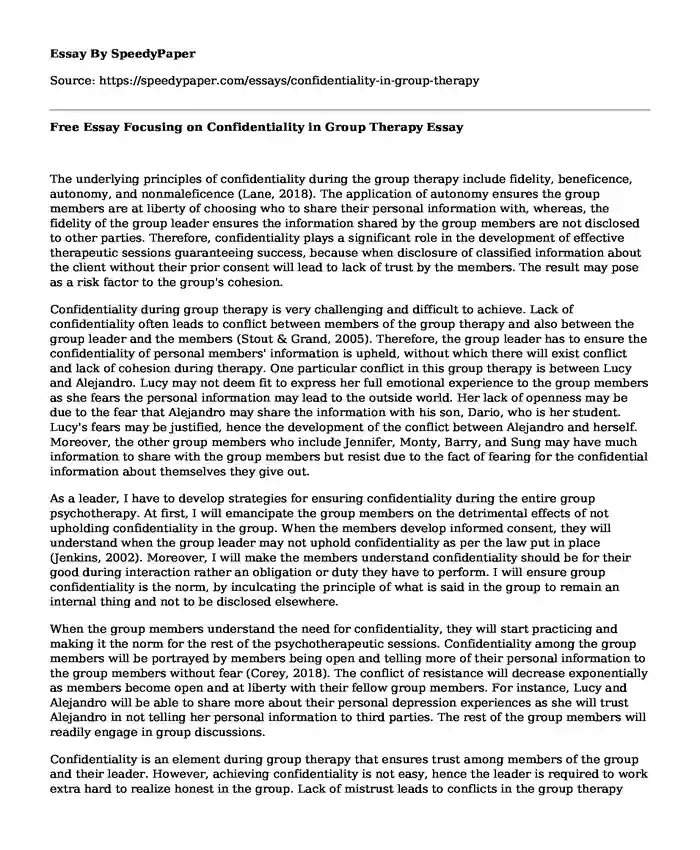
| Type of paper: | Course work |
| Categories: | Counseling |
| Pages: | 3 |
| Wordcount: | 632 words |
The underlying principles of confidentiality during the group therapy include fidelity, beneficence, autonomy, and nonmaleficence (Lane, 2018). The application of autonomy ensures the group members are at liberty of choosing who to share their personal information with, whereas, the fidelity of the group leader ensures the information shared by the group members are not disclosed to other parties. Therefore, confidentiality plays a significant role in the development of effective therapeutic sessions guaranteeing success, because when disclosure of classified information about the client without their prior consent will lead to lack of trust by the members. The result may pose as a risk factor to the group's cohesion.
Confidentiality during group therapy is very challenging and difficult to achieve. Lack of confidentiality often leads to conflict between members of the group therapy and also between the group leader and the members (Stout & Grand, 2005). Therefore, the group leader has to ensure the confidentiality of personal members' information is upheld, without which there will exist conflict and lack of cohesion during therapy. One particular conflict in this group therapy is between Lucy and Alejandro. Lucy may not deem fit to express her full emotional experience to the group members as she fears the personal information may lead to the outside world. Her lack of openness may be due to the fear that Alejandro may share the information with his son, Dario, who is her student. Lucy's fears may be justified, hence the development of the conflict between Alejandro and herself. Moreover, the other group members who include Jennifer, Monty, Barry, and Sung may have much information to share with the group members but resist due to the fact of fearing for the confidential information about themselves they give out.
As a leader, I have to develop strategies for ensuring confidentiality during the entire group psychotherapy. At first, I will emancipate the group members on the detrimental effects of not upholding confidentiality in the group. When the members develop informed consent, they will understand when the group leader may not uphold confidentiality as per the law put in place (Jenkins, 2002). Moreover, I will make the members understand confidentiality should be for their good during interaction rather an obligation or duty they have to perform. I will ensure group confidentiality is the norm, by inculcating the principle of what is said in the group to remain an internal thing and not to be disclosed elsewhere.
When the group members understand the need for confidentiality, they will start practicing and making it the norm for the rest of the psychotherapeutic sessions. Confidentiality among the group members will be portrayed by members being open and telling more of their personal information to the group members without fear (Corey, 2018). The conflict of resistance will decrease exponentially as members become open and at liberty with their fellow group members. For instance, Lucy and Alejandro will be able to share more about their personal depression experiences as she will trust Alejandro in not telling her personal information to third parties. The rest of the group members will readily engage in group discussions.
Confidentiality is an element during group therapy that ensures trust among members of the group and their leader. However, achieving confidentiality is not easy, hence the leader is required to work extra hard to realize honest in the group. Lack of mistrust leads to conflicts in the group therapy sessions, and only the presence of confidentiality will work to bring cohesion.
References
Corey, G. (2018). Theory & Practice of Group Counseling (9th ed.)
Jenkins, P. (2002). Legal issues in counseling & psychotherapy. London: SAGE.
Lane, D. (2018). The legal guide for practicing psychotherapy in Colorado. Denver: Continuing Legal Education in Colorado.
Stout, C., & Grand, L. (2005). Getting started in private practice. New York: Wiley.
Cite this page
Free Essay Focusing on Confidentiality in Group Therapy. (2022, Jul 19). Retrieved from https://speedypaper.net/essays/confidentiality-in-group-therapy
Request Removal
If you are the original author of this essay and no longer wish to have it published on the SpeedyPaper website, please click below to request its removal:
- Literary Essay Sample: Death of a Salesman vs The White Heron
- Essay Sample: My View of Sex Life Conventions
- Free Essay on the Life and Experiences of Medical Personnel during World War 1
- Free Essay with Employee Empowerment Article Review
- The Mercy Journals - Argumentative Essay Sample
- Free Essay Sample on Social Media and Phonelessness Experience
- The Second Industrial Revolution - Free Essay in American History
Popular categories




